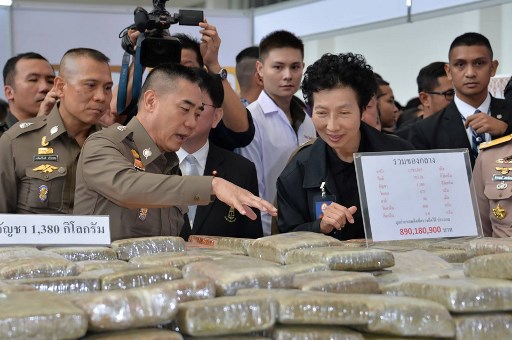
YANGON, Myanmar (AFP) — “Golden Triangle” countries must address corruption and collaborate more closely to tackle record meth production and the gangs who traffic the drug across Southeast Asia and beyond, the UN said Monday.
From Bangkok to Brisbane, authorities are raking in huge hauls of methamphetamine stimulant pills — better known as “yaba” — and the purer, more potent crystallized version known as “ice.”
They hail from the “Golden Triangle,” a lawless wedge of land that intersects China, Laos, Thailand, and Myanmar and is the world’s second-largest drug-producing region.
Its drug labs — mainly in Myanmar’s conflict-ridden Shan State — are working overtime, aiding organized crime gangs in their quest for new markets as far away as Australia and Japan.
Worth an estimated $40 billion a year, huge volumes of meth pass through the Golden Triangle, waved through by corrupt law enforcement and border controls.
“Ensuring governance and the rule of law will be crucial to any long-term reduction in drug production and trafficking,” said Jeremy Douglas, regional representative of the United Nations Office on Drugs and Crime for Southeast Asia and the Pacific.
“To be candid, it also means addressing the corruption, conditions, and vulnerabilities that allow organized crime to keep expanding operations.”
He was speaking in the Myanmar capital Naypyidaw at a rare regional meeting of police and officials who are aiming to forge a new strategy to fight the drug scourge.
In recent months several Myanmar soldiers have been arrested with massive caches of yaba, destined for Bangladesh.
Myanmar authorities say they are ready to cooperate with their neighbors to stem the flow of drugs and precursor chemicals used by the cook houses in Shan State.
“A top priority for us is a regional precursor strategy that will slow the supply of chemicals… into the drug-producing areas of the Golden Triangle,” Myanmar’s Deputy Home Minister Major General Aung Soe said in a statement.
A surge in supply has seen prices for a single yaba pill plummet to around $2 at its cheapest in Thailand and around $7 in Singapore, according to UNODC figures, raising fears over addiction rates.
The UN agency also urged regional governments to address money laundering, share more intelligence on the drug gangs and offer community-based rehabilitation for addicts and petty dealers rather than jail.
© Agence France-Presse







